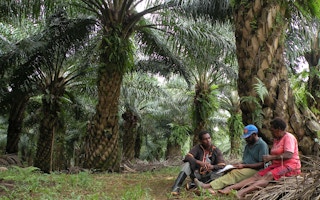As palm oil has become one of the most in-demand global commodities over the past several years, oil palm plantations have proliferated quickly throughout the tropics. Oil palm is currently grown in more than 40 countries, and these operations are often associated with high levels of deforestation, especially in Southeast Asia and, to a lesser extent, South America.
Just about everyone, from citizens of the world and their respective governments to civil society groups and the private sector, agrees that we have to find ways to continue economic development without destroying what’s left of our planet’s forests. But when it comes to producing palm oil, there hasn’t been consensus on the best mechanisms for achieving the “No Deforestation” goals so many companies have adopted — or at least, there wasn’t until now.
There were essentially two competing methodologies for determining what constitutes a “High Carbon Stock” landscape and setting rules for conversion of land to oil palm plantations in a sustainable manner prior to this announcement.
One, the High Carbon Stock Approach (HCSA), was first developed in 2010 by a coalition of businesses and civil society groups. The other, known as HCS+, was put forward last year by a group called the Sustainable Palm Oil Manifesto (SPOM), which included many of the same companies that had developed the HCSA.
“
The Agreement is a significant step in uniting the palm oil industry and all its stakeholders toward a common understanding about how to protect forests and peatlands.
Dato’ Lee Yeow Chor, CEO, IOI Corporation Berhad
But now the HCS Convergence Working Group, which includes major players in the palm oil industry (Asian Agri, Cargill, Golden Agri-Resources, IOI Corporation Berhad, KLK, Musim Mas, Sime Darby, Unilever, and Wilmar International) as well as NGOs (Forest Peoples Programme, Greenpeace, Rainforest Action Network, TFT, Union of Concerned Scientists, and WWF), announced in Bangkok on Tuesday that they will be releasing a revised HCSA toolkit that represents convergence between the HCSA and HCS+ approaches in early 2017.
In other words, there will now be one agreed-upon set of rules for companies to use when implementing their commitments to address the deforestation associated with their operations.
“The Group has agreed on a single, coherent set of principles for implementation of companies’ commitments to ‘no deforestation’ in their palm oil operations and supply chains,” according to a statement announcing the agreement. “The members of the Group worked together constructively to develop recommendations that provide a roadmap forward for addressing the issues that remain in a collaborative and integrated way.”
Tropical forests, where most oil palm is grown due to the fact that the humid tropics are the species’ natural range, sequester large amounts of carbon and harbor much of Earth’s biodiversity, in addition to providing livelihoods, food, and medicine to millions of indigenous peoples and local communities.
The agreement reached by the HCS Convergence Working Group includes the fundamental elements of a methodology to protect high carbon stock (HCS) forests and other high conservation value (HCV) areas such as peatlands. Forest stratification, below-ground carbon, and decision-making in “young regenerating forests,” a class of forest that was at the heart of the disagreement between the HCSA and HCS+ approaches, are all dealt with in the new methodology.
But simply achieving “no deforestation” is not the only goal of the revised HCSA approach. The role forests play in regulating the global climate via carbon sequestration is also taken into account, as is implementation of free, prior, and informed consent (FPIC) for indigenous and other forest communities.
“The Agreement is a significant step in uniting the palm oil industry and all its stakeholders toward a common understanding about how to protect forests and peatlands,” Dato’ Lee Yeow Chor, CEO of IOI Corporation Berhad, said in a statement. “More importantly, it will lead to collaborative and concrete actions on the ground toward achieving this goal.”
In recognition of the fact that the methodology must evolve over time, members of the HCS Convergence Working Group say they are not only committed to furthering the implementation of the converged approach they’ve proposed but also to addressing a variety of important issues that have not yet been dealt with, such as developing systems to ensure high-quality assessments, independent verification, and means of redress for communities whose rights are infringed upon.
“We welcome the agreement that the converged High Carbon Stock method will include Social Requirements to ensure that the rights and livelihoods of indigenous peoples, local communities, smallholders and workers are properly accommodated,” Marcus Colchester of the Forest Peoples Programme said in a statement.
“Respect for customary rights, food security, community involvement in land use planning and free, prior and informed consent are critical building blocks to ensure sound development outcomes, alongside incentives and support, for both communities and planters, to maintain forests and high conservation values.”
This story was published with permission from Mongabay.com










